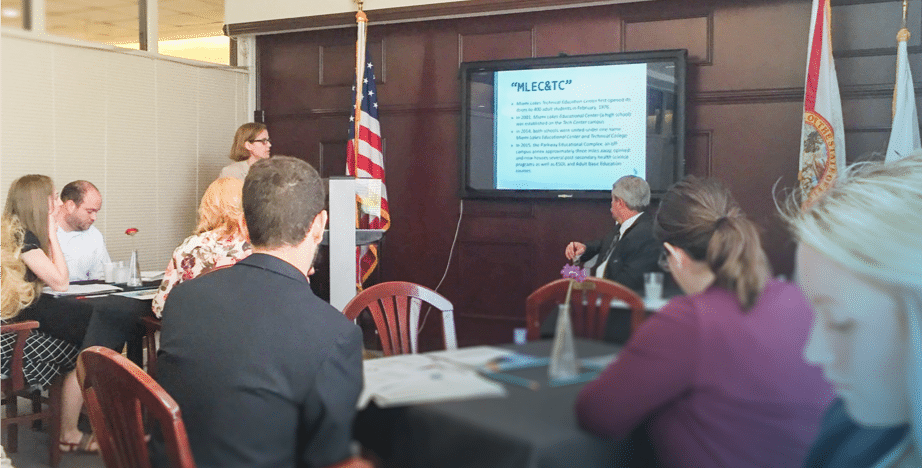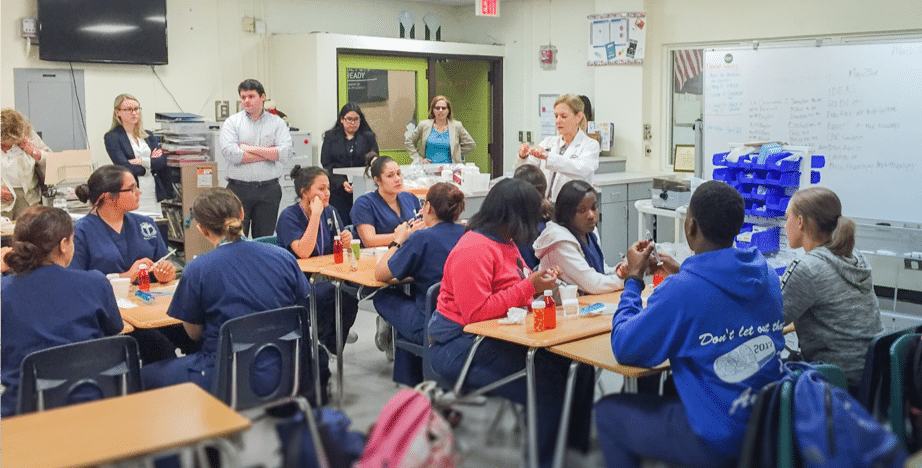Overview
The Community Education Pathways to Success (CEPS) model targets out-of-school youth who have expressed interest in earning a GED by addressing low literacy and math skills through an integration of youth development, social supports, and career-related services. The CEPS model, in partnership with community-based organizations, supports participants through completing their education, entering college, finding working, and contributing to their communities. This forum will provide an overview of the model, discuss results from a recently released evaluation, and provide recommendations for policy.
The CEPS model was developed by the Youth Development Institute and is currently operating at eight sites throughout New York City. CEPS’s goals are to 1) Strengthen the capacity of community organizations to provide high quality and integrated youth development, support, and education services and 2) Enable returning youth to develop skills, attitudes, experiences, and credentials to achieve self-sufficiency and active involvement. The cornerstone of CEPS is the high-quality instruction infused with youth development practice. Ramp-Up and Mathematics Navigator, curriculums designed by America’s Promise, provide the foundational academic and self-efficacy skills students need to be successful in educational and career-related endeavors. The primary youth development practices utilized include high expectations for youth; opportunities for youth to contribute; continuity of relationships with youth; engaging activities for youth; caring and trusting relationships; and physical, emotional, and psychological safety.
Since its initial implementation year in 2005/06, CEPS sites participated in a third party evaluation conducted by Campbell-Kibler Associates, Inc. The recently released final evaluation demonstrates the impact the program is making on student population with limited educational opportunities. Key findings include:
- CEPS participants averaged literacy gains of 1.5 years
- CEPS participants math gains of nearly 1 year in less than one semester of study.
- Numbers of participants who successfully transition to GED preparation programs increased and was significantly higher than other comparable programs
- The CEPS model is replicable and expandable
The CEPS model is effectively serving a known need of the dropout population: low literacy and numeracy skills that often make them ineligible for most GED and Workforce Investment Act programs. Over the past five years, CEPS has been able to almost triple the number of students being served, but these numbers do not begin to address the enormous numbers of students who need such services. The population in need of such programs continues to be far greater than can be served by CEPS.
CLICK HERE TO VIEW FULL FORUM BRIEF
SPEAKERS
Patricia B. Campbell, PhD, President of Campbell-Kibler Associates, Inc, has been involved in educational research and evaluation with a focus and issues of race/ethnicity, gender and disability since the mid 1970’s. Her BS, from LeMoyne College is in Mathematics, her MS, from Syracuse University, is in Instructional Technology and her PhD, also from Syracuse University, is in Teacher Education. Dr. Campbell, formerly an associate professor of research, measurement and statistics at Georgia State University, has authored more than 100 publications including co-authoring Engagement, Capacity and Continuity: A Trilogy for Student Success and Upping the Numbers:Using Research-Based Decision Making to Increase Diversity in the Quantitative Sciences with Eric Jolly and Lesley Perlman. She also is a co-author, with Beatriz Chu Clewell, of What Do We Know?: Seeking Effective Math and Science Education andCreating Good Schools in Poor Neighborhoods:Defying Demographics, Achieving Success andBuilding Evaluation Capacity: Guide I Designing A Cross Project Evaluation and Guide II Collecting and Using Data in Cross-Project Evaluations.
Dr. Campbell’s professional activities have been diverse ranging from doing training in educational evaluation and research in South Africa and Uganda to serving as an expert witness in the sex discrimination case brought against the Citadel. She was a member of the US Department of Education’s Impact Review Panel and was part of the team involved in the development of the National Science Foundation publications A Framework for Evaluating Impacts of Informal Science Education Projects and Infusing Equity in Systemic Reform: An Implementation Scheme. An Association for Women In Science (AWIS) Fellow, she received the Betty Vetter Research Award from Women and Engineering Program Advocates Network (WEPAN) and the Willystine Goodsell Award from the American Educational Research Association.
Jack Doyle has served as Executive Director of New Settlement Apartments since 1995. He is responsible for all aspects of the housing and community-service operations (with annual budget of $11.7 million). As a result of his leadership in youth development and community programming over the past decade, New Settlement’s programs have grown and now serve over 5,600 neighborhood children, teens and adults annually.
Before assuming his current position, Jack spent 18 years at the American Red Cross of Greater New York (1977-95), where he served as Administrator for Services to Homeless Families (1985-95), Deputy Director for Disaster Services (1979-85), Director of the Cuban and Haitian Entrants’ Shelter Program (1982-85), and Disaster Services Specialist (1977-79). During his tenure at the Red Cross, he negotiated large contracts with city and state government to create transitional housing facilities, licensed day care centers, and community health care centers for homeless families, including refugees.
Jack grew up in the Bronx and graduated from Fordham University. In the late 1970s, he was an integral part of community revitalization in the Bronx, when he moved — with his wife and young children — into an abandoned building that was compromising the safety of the block, and renovated it with the collective “sweat equity” of his and nine other families.
Jack was Chairman of the Board of Directors of the Coalition for the Homeless from 1991-95 and serves on the Board of GEEL Community Services. Since the 1980s he has served on task forces focused on housing policy and homelessness convened by the NY State Governor, the Manhattan Borough President, the Bar Association of the City of New York and diverse coalitions.
Peter Kleinbard is the Executive Director of the Youth Development Institute. A graduate of Yale University, he worked with young people in the performing arts prior to coming to New York, where he joined the National Commission on Resources for Youth (NCRY), and became the Executive Director of NCRY, promoting practices of youth participation, employment and service in schools and community organizations. In 1984, Mr. Kleinbard established the Young Adult Learning Academy (YALA) in New York City, a school that assists older youth who have dropped out of regular schools to enter employment and further education. In 1996, he joined the Wallace-Reader’s Digest Funds where he conducted the largest national funding initiatives in education and career development for young adults. He joined the Fund for the City of New York in 2001, serving as Vice-President and Director of the Youth Development Institute (YDI). YDI left the Fund in 2007, and went under the national umbrella of the Tides Center. He has published widely in the youth field.
As director of Young Adult Initiatives at the Youth Development Institute, Vivian Vázquez heads Community Education Pathways to Success (CEPS) and the NYC Partnership for College Access and Success (NYCPCAS). CEPS works with 13 NYC CBOs and 3 public libraries to provide services to youth who have dropped out of school withy low academic skills. NYCPCAS works with the NYC College of Technology and several community-based organizations to enable former disconnected youth to enter and complete college.
Vivian joined YDI in 2004 as Coordinator of the Career Internship Network (CIN), which provides networking opportunities and workshops to cultural organizations in NYC that operate internship programs for NYC high school students.
Prior to joining YDI, Vivian worked at the Citizens Advice Bureau for nine years, overseeing a wide variety of programs under its Children and Youth Department and three Senior Centers.
- 2009 CEPS Abstract with Model
- CEPS Final Evaluation Report with Appendices
- November 2008 Youth Notes
- NSA Handout




